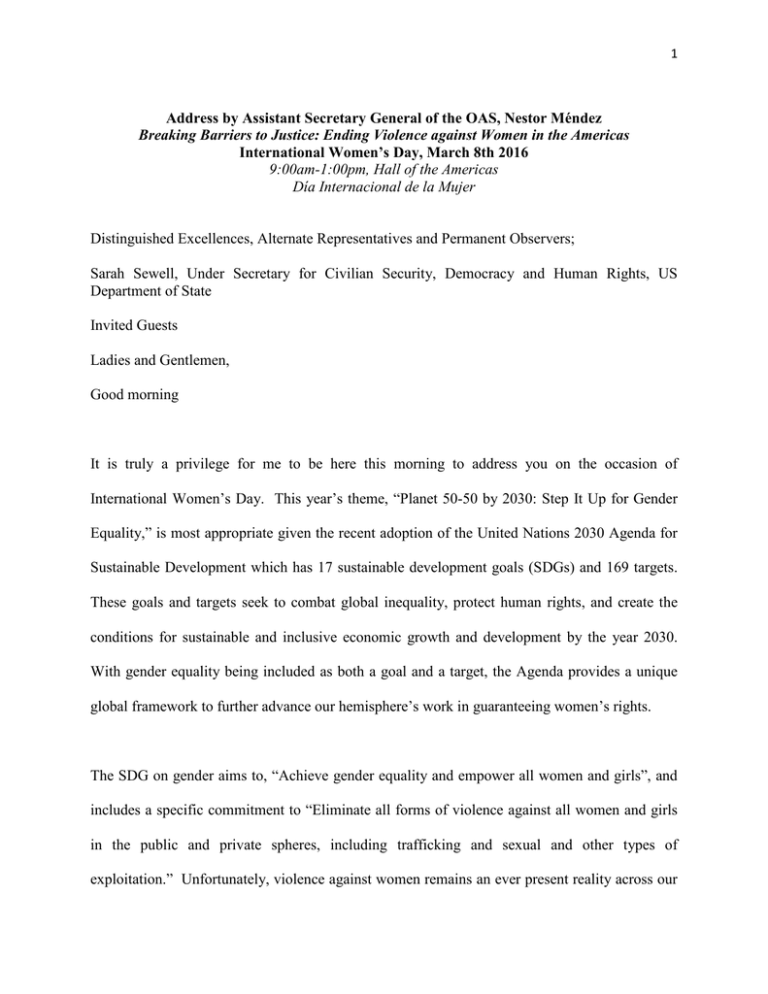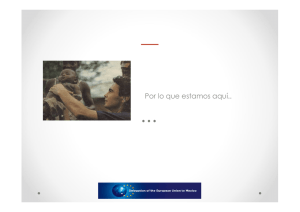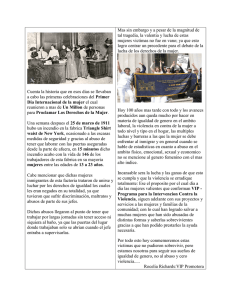Address by Assistant Secretary General of the OAS, Nestor Méndez
Anuncio

1 Address by Assistant Secretary General of the OAS, Nestor Méndez Breaking Barriers to Justice: Ending Violence against Women in the Americas International Women’s Day, March 8th 2016 9:00am-1:00pm, Hall of the Americas Día Internacional de la Mujer Distinguished Excellences, Alternate Representatives and Permanent Observers; Sarah Sewell, Under Secretary for Civilian Security, Democracy and Human Rights, US Department of State Invited Guests Ladies and Gentlemen, Good morning It is truly a privilege for me to be here this morning to address you on the occasion of International Women’s Day. This year’s theme, “Planet 50-50 by 2030: Step It Up for Gender Equality,” is most appropriate given the recent adoption of the United Nations 2030 Agenda for Sustainable Development which has 17 sustainable development goals (SDGs) and 169 targets. These goals and targets seek to combat global inequality, protect human rights, and create the conditions for sustainable and inclusive economic growth and development by the year 2030. With gender equality being included as both a goal and a target, the Agenda provides a unique global framework to further advance our hemisphere’s work in guaranteeing women’s rights. The SDG on gender aims to, “Achieve gender equality and empower all women and girls”, and includes a specific commitment to “Eliminate all forms of violence against all women and girls in the public and private spheres, including trafficking and sexual and other types of exploitation.” Unfortunately, violence against women remains an ever present reality across our 2 hemisphere. Many women are afraid to report cases of abuse due to fear of reprisal from their abusers or chastisement from family members and peers. As a consequence, most incidences remain largely unquantified and often undocumented making it difficult to obtain a clear understanding of the magnitude and depth of this problem. However, it is now widely recognized that 1 in 3 women will face some form of violence, usually at the hands of an intimate partner, within their lifetime. For far too long, women have been denied the basic human rights, parity and equality enjoyed by their male counterparts in the workplace, at home, and in many social settings. Our societies, laden with age-old cultural perceptions on the role of a woman and her entitlements or lack thereof, have turned a blind eye to the myriad injustices and cases of abuse experienced by women and young girls who make up a large part of our populations and who, undeniably, are the backbone of our communities. These are the women who must maintain the proverbial balance between attending to the home, raising a family, being a loving wife or significant other, excelling in the work place, spending time with family and friends, while finding time for herself. Yet, we turn our backs to the crisis situation of repeated violence and injustice that many of our women and young girls endure. The OAS remains firm in its commitment to support women’s rights and we are proud to be hosting today’s event on ‘Breaking Barriers to Justice: Ending Violence against Women in the Americas’. 3 Nosotros continuáramos trabajando para ayudar a los Estados Miembros promulgar políticas y programas que aborden los desafíos que enfrentan las mujeres. En ese contexto, para luchar contra el flagelo de la violencia contra las mujeres, en 1994, 32 Estados Miembros de la OEA ratificaron la Convención Interamericana para Prevenir, Sancionar y Erradicar la Violencia contra la Mujer, conocida comúnmente como la Convención de Belem do Pará. Durante los últimos veinte años de aplicación de dicha Convención, podemos reportar algunos avances significativos, tales como: Las Américas como región tiene el marco legal más fuerte en el tema de la violencia contra las mujeres en el ámbito internacional; Y el 78% de los Estados han reconocido la violencia patrimonial o económica. Sin embargo, a pesar de estos avances, ciertos desafíos persisten, de los cuales mencionaré algunos: - Sólo 19 de los 32 Estados penalizan la violación dentro del matrimonio; - Sólo 15 de los 32 Estados sancionan la violencia que se comete por el Estado o sus funcionarios; - Sólo 10 de los 32 Estados reconocen el delito de feminicidio, ya sea como un delito en sí o como una circunstancia agravante del homicidio; - Y sólo ocho de los 32 Estados tienen leyes integrales que sancionan la violencia contra la mujer en todas sus formas, tanto en el ámbito público y privado; Furthermore, between 2014 and 2015, the Committee of Experts of the Follow-Up Mechanism to the Belém do Pará Convention – the MESECVI – carried out a comprehensive evaluation of the implementation of the Convention in all 32 States Party. The evaluation concluded that despite 4 progress made in strengthening the legal framework on violence against women in those States – which would serve to, among other things, address deficiencies in how cases are reported, provide protection to battered women, and build capacity in the judicial system to identify and adjudicate cases successfully – its impact has not been felt. This is due to a variety of factors, including lack of adequate data, insufficiently funded and resourced policies and programs, and a justice system indifferent to the issue of violence against women or unaware of the Convention and its applicability at the national level. It is not surprising then that access to justice is a major problem for many battered women. And the obstacles are even greater for women of a certain ethnicity, socio-economic status, sexual orientation or gender identity who face seemingly insurmountable hurdles to be taken seriously and seek justice. This is the issue for which we gather today, which is not just violence against women, but the violence endured by specific groups of women. The plight of these women has gone largely unnoticed in legislative policies and societal programs designed to address the issue of violence against women and it has also hardly been recognized in the mainstream movement on women’s rights. Today’s event thus, seeks to address this issue and share some of the innovative and successful practices being carried out across the hemisphere to ensure that these particular women’s issues are being adequately addressed. El Secretario General Almagro subrayó el lema, "más derechos para más gente" como plataforma en la que se basa esta administración. Es nuestro objetivo de utilizar esta inmensa 5 plataforma que se nos ha brindado por los Estados Miembros para garantizar que se convierta en una realidad en nuestro hemisferio. Pero primero tenemos que empezar en casa. Aquí, en esta venerable Organización, que también ha sido atrapada en la red maligna de la discriminación institucional y cultural de género y el desequilibrio que afecta a nuestras sociedades y que ha puesto en duda nuestra propia modernidad y sensibilidad. Esto, ya no lo toleraremos. Debemos practicar lo que predicamos. Como tal, es para mí un gran placer anunciar que ayer lunes, 7 de marzo, la OEA adoptó oficialmente su primera 'Política Institucional de Igualdad de Género, Diversidad y Derechos Humanos en la Secretaría General de la OEA”. La Política, cual será coordinada por la Comisión Interamericana de Mujeres (CIM), es el compromiso de la Organización para redoblar sus esfuerzos en lograr la paridad de género institucional y ayudar a contribuir en la construcción de un planeta 50/50. Busca institucionalizar la igualdad de género y de derechos humanos en las políticas de trabajo, programas, proyectos y prácticas de la OEA, así como en su cultura y estructura organizacional. Esto se logrará a través de metas y objetivos claramente definidos y directrices para su implementación y seguimiento. A tal efecto, se ha establecido una Comisión de Implementación y Seguimiento de la Política para elaborar un programa de trabajo que incluya un Plan de Acción que contenga medidas concretas necesarias para llevar a cabo la Política. Esta Comisión está compuesta por representantes de la Oficina del Secretario General, la Secretaría Ejecutiva de la CIM, la Consejería Estratégica para el Desarrollo Organizacional y la Gestión por Resultados, el Departamento de Recursos Humanos, el Departamento de Asesoría Legal, la Asociación de 6 Personal de la OEA, la Oficina del Ombudsperon, y la Secretaría Ejecutiva de la Comisión Interamericana de Derechos Humanos (CIDH), que han sido asignadas tareas específicas para asegurar que se implemente y se dé seguimiento a la Política exitosamente. It is our hope that this Policy will serve to break down our own institutional gender biases and foster a culture of equal opportunity and equal treatment. The Office of the Ombudsperson, which was created to help personnel address work-related concerns and resolve conflict through informal means, has played a pivotal role so far in identifying and addressing systematic genderbased discrimination. Its knowledge of these issues will only help to advance the work of the Commission. With respect to our Member States, we salute the 3 female Permanent Representatives and 2 Interim Representatives whom we will be counting on to help support our efforts and look to them to help champion a gender perspective in the programs and activities not only of this organization but the wider Inter-American System. However, we also hope to see the appointment of more female envoys to offset the gender imbalance and advocate for greater focus on the issues affecting women in our hemisphere. In that same vein, to our donors and strategic partners: your funds and collaboration have helped us tremendously to carry out programs and projects that have a direct impact on our communities. As such, we implore you to support our efforts by funding more gender-based programs and encouraging that a gender-based perspective is included in certain projects and activities. 7 There is much more work to be done, but we nevertheless recognize the progress which has thus far been attained. Today is the day we celebrate. We celebrate the women gathered here today whose tireless pursuits have helped to change the lives of so many women and young girls. We celebrate the men who have gone against the grain and heeded the call to action. We celebrate the OAS for taking the necessary steps towards gender parity and equality. We celebrate the Member States for ensuring that our hemisphere continues to implement the policies and programs that help to advance women’s equal rights. Indubitably, since the signing of the Belém do Pará Convention our hemisphere has made great strides in improving the legal framework to address violence against women, change societal and cultural norms on women’s rights, and empower women to speak up. I hope that today’s event will bring more clarity to the issues that affect women of marginalized and vulnerable groups and enable a rich discussion on ways to address and overcome these challenges. I thank you. Muchas Gracias


